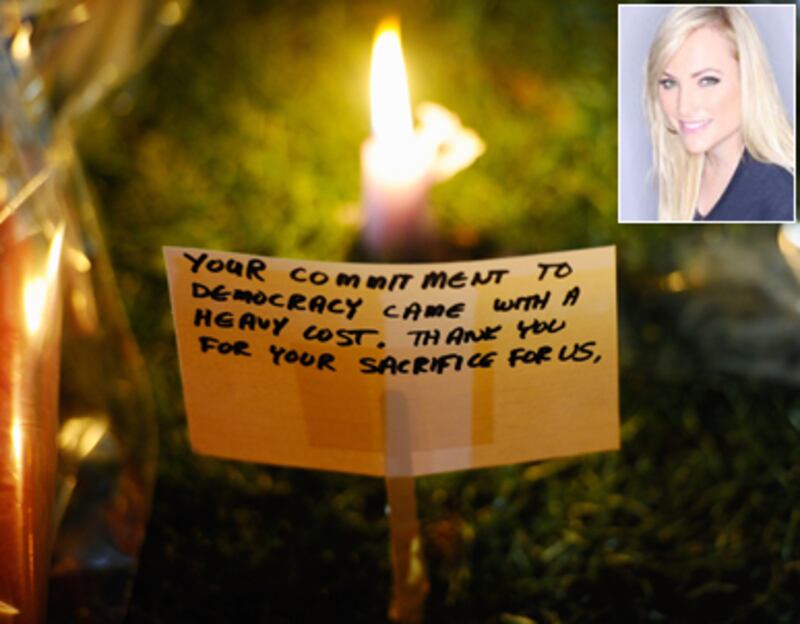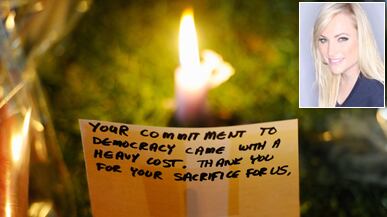When something so tragic and senseless happens in American culture like the recent shooting of Congresswoman Giffords, we are left with unanswerable questions and the sad task of trying to make meaning of what has happened. For all Americans, a tragic event like this hits close to home and we are left with the aftereffects, scrambling for some semblance of rationale, which is where the inevitable politicizing of Congresswoman Giffords’ shooting begins. What is particularly sad and telling about the climate of today’s media cycle is that it seems to have taken the media this kind of moment to start analyzing their own rhetoric—even if that rhetoric wasn’t the reason for the tragedy.

What happened has really hit home for a lot of my friends, not only because some of them grew up with me in Arizona, but because we are the generation who experienced Columbine as adolescents, 9/11 as teenagers, Virginia Tech as college students, and other horrific incidents. We feel like we’ve been here before. The discussion about violence, gun control, and greater screening of the mentally ill is nothing new. What is new is that for the first time there is a media climate that breeds greater polarization and anger because of the explosion of social media and the state of our politics. We breed it ourselves with the anonymity of the Internet, which has in turn bred the fear that has become a part of our daily lives. It is not just politics that has these sorts of scare tactics, but we now live in a world where a congresswoman can’t meet with her constituents at a grocery store without fearing for her life.
Congresswoman Giffords is by all accounts a well-liked, moderate politician who doesn’t fall into the fray of partisan baiting and yet was harassed and threatened through the last election cycle. Being harassed and threatened is nothing new in politics, but what is unprecedented today is that politicians and people are threatened, harassed, and belittled for being moderates on both sides of the aisle. Questions about how individuals and politicians can meet in the middle are met with disdain and mockery and, yes, even threats. It is politically simple and, dare I say, easy to excite extremists and there are many politicians out there that do it very well. What is more difficult is meeting in the middle ground in a calm and respectful manner. As short a time ago as when I was growing up, this was not so unprecedented in politics, but in the last 10 years we have seen a shift both in the media and with politicians. Even if the political climate is physically dangerous with a man going on a shooting spree for no reason, there is also another risk in our polarizing political climate: that it will continue to disenchant and turn off voters and especially the younger generations. That disenchantment is what leads to anger and apathy toward any involvement in the process. Although I do not believe this shooter's motives had anything to do with the current political climate, it’s good that the media is questioning the dangerous levels that the rhetoric has reached nonetheless. I just hope that everyone—the media, our politicians, and we as citizens—takes this tragedy as a sign of a bigger problem and actually does something to tone done the rhetoric and start taking more responsibility for our polarized country.
I just hope that everyone—the media, our politicians, and we as citizens—takes this tragedy as a sign of a bigger problem and actually does something to tone done the rhetoric and start taking more responsibility for our polarized country.
Will this actually happen? Only time will tell, but finally issues that may have been overlooked are now being analyzed with a closer lens and both politicians and the media are going to have to come to a reckoning over the kind of language that they have been using and in what medium and context they have been using it. The funerals for those killed are being held today in Tucson and it is a national day of mourning. Although we will never really know the reason for the murders in Tucson, hopefully it will be a kind of wakeup call to all of us and just what kind of damage we are doing with our political climate.
Meghan McCain is a columnist for The Daily Beast. Originally from Phoenix, she graduated from Columbia University in 2007. She is a New York Times bestselling children's author, previously wrote for Newsweek magazine, and created the Web site mccainblogette.com. Her new book, Dirty Sexy Politics, was published in August.





